After calls for reform following protests throughout the city, the Minneapolis City Council voted on changes to the city’s police department at an emergency meeting Friday.
The agreement bans Minneapolis Police Department officers from using chokeholds and requires them to report and intervene during excessive use of force incidents by an officer, regardless of rank. Failure to intervene during these incidents will result in the same discipline as actually using excessive force. MPD’s chief also must approve any use of crowd control weapons like rubber bullets and tear gas.
The changes are a result of a temporary restraining order put on the Minneapolis Police Department as part of an ongoing investigation by the Minnesota Department of Human Rights.
Minnesota Department of Human Rights Commissioner Rebecca Lucero said the investigation will look at the police killing of George Floyd and the last 10 years of MPD to determine if there are “systemic practices that lead to discrimination.”
“George Floyd should be alive today. Mr. Floyd’s death is just one instance of unthinkable violence against Black men by law enforcement generally and by the Minneapolis Police Department specifically,” said Council President Lisa Bender.
Council members including Bender and Jeremiah Ellison, who represents Ward 5, have called for further reform efforts. Both Bender and Ellison said on Twitter Thursday that they supported dismantling MPD entirely.
“We are going to dismantle the Minneapolis Police Department. And when we’re done, we’re not simply gonna glue it back together. We are going to dramatically rethink how we approach public safety and emergency response. It’s really past due,” Ellison’s tweet reads.
Ward 4 Council member Phillipe Cunningham said past reform by the city efforts haven’t gone far enough. Cunningham called for a “complete transformation” of the city’s public safety approach.
“I am not interested in any more reforms. Diversifying departments, body cams, trainings, residency requirements have all proven to not significantly change the culture of police departments,” he said.
In recent years, the City Council and Mayor Jacob Frey have implemented programs including a mental health co-responder program to respond to crisis calls. Two Somali officers also joined the force last year in an effort to better represent local communities.
Frey said more reform efforts can prove challenging for officials thanks to state law and MPD union agreements.
“The work has been going on for years and decades, but in many instances, mayors and council members and elected officials and chiefs have been thwarted in getting some of the change that has been so necessary. And they’ve been thwarted by police unions and laws that so severely limited accountability among police departments,” he said.









